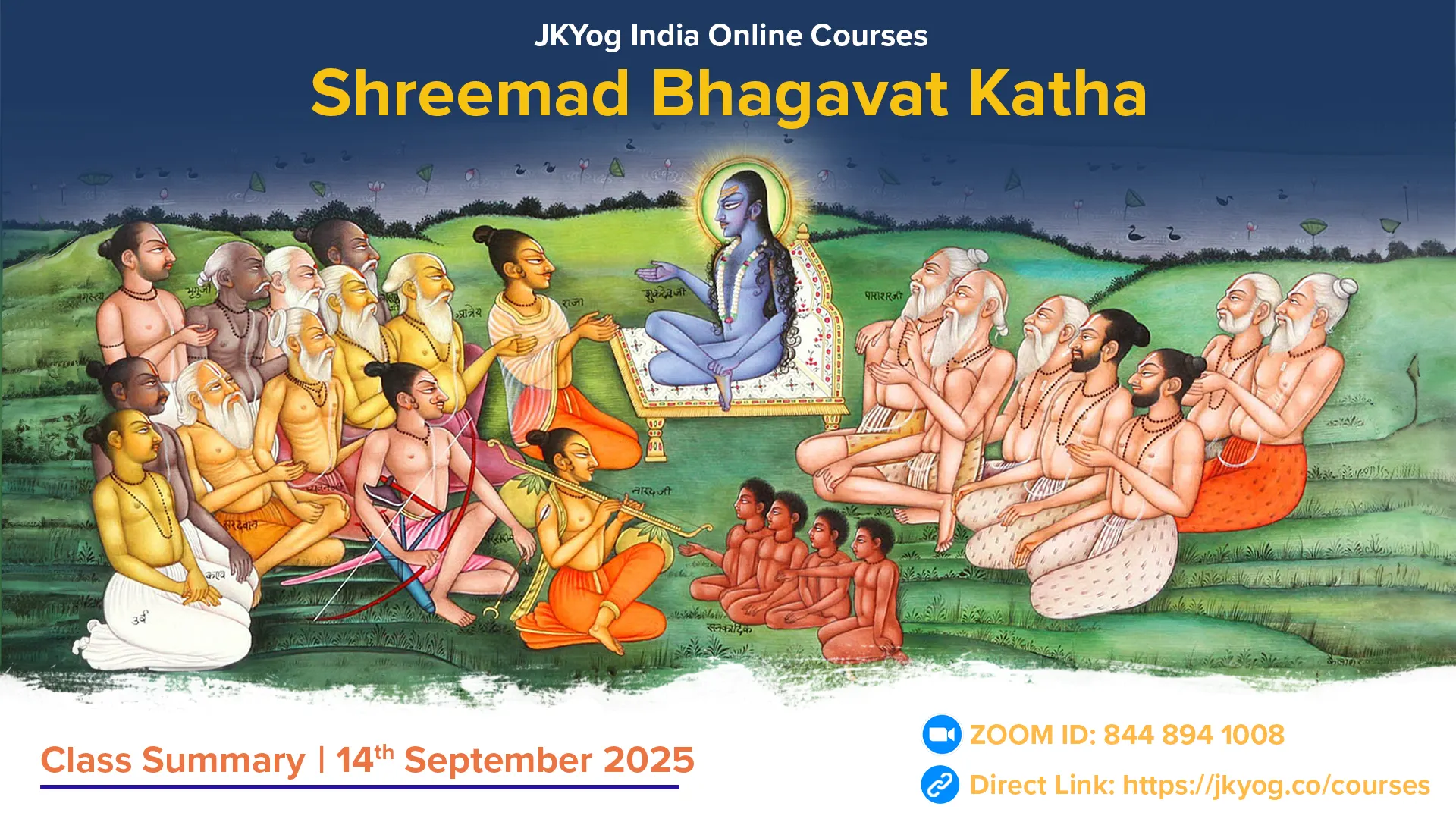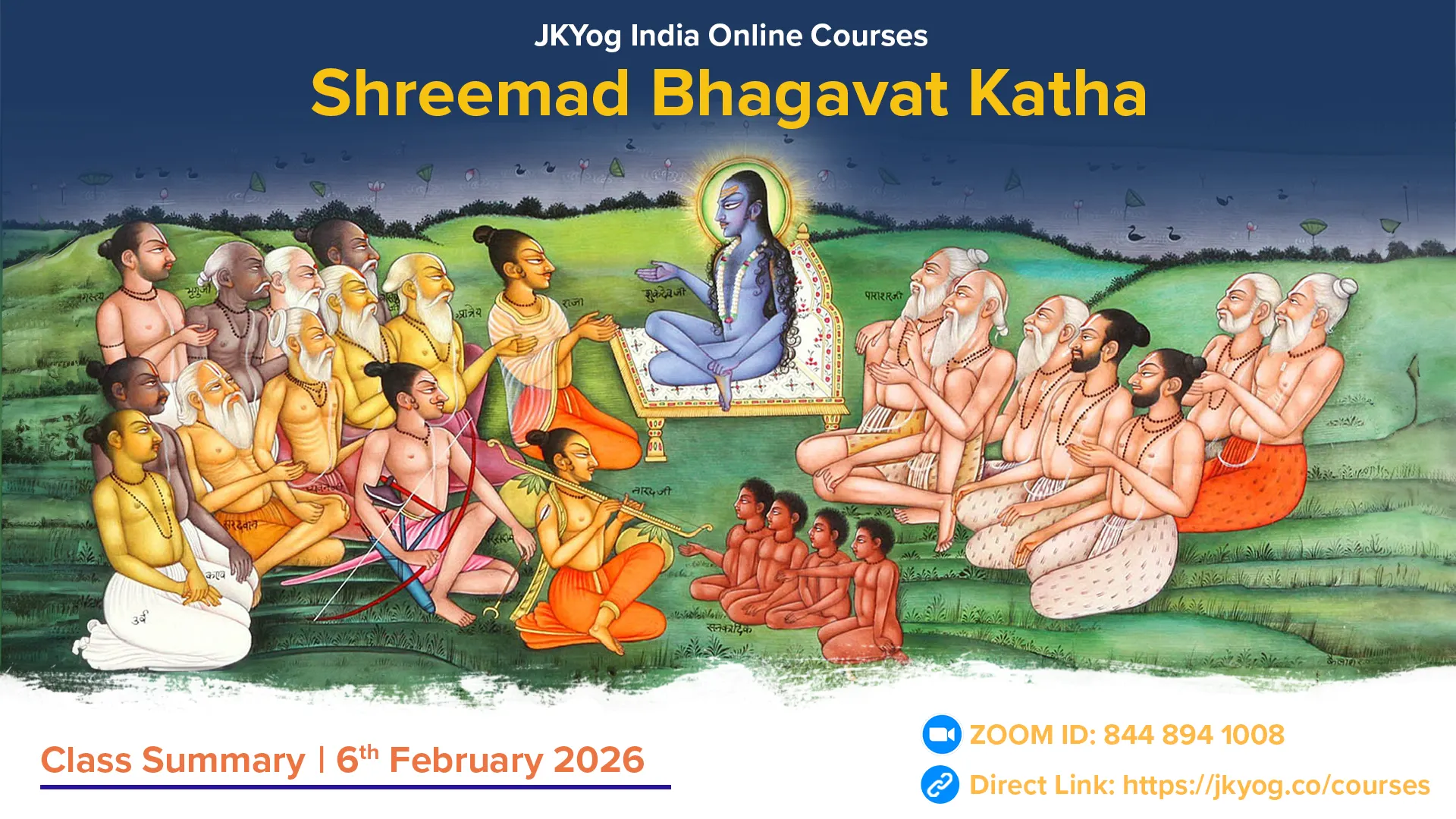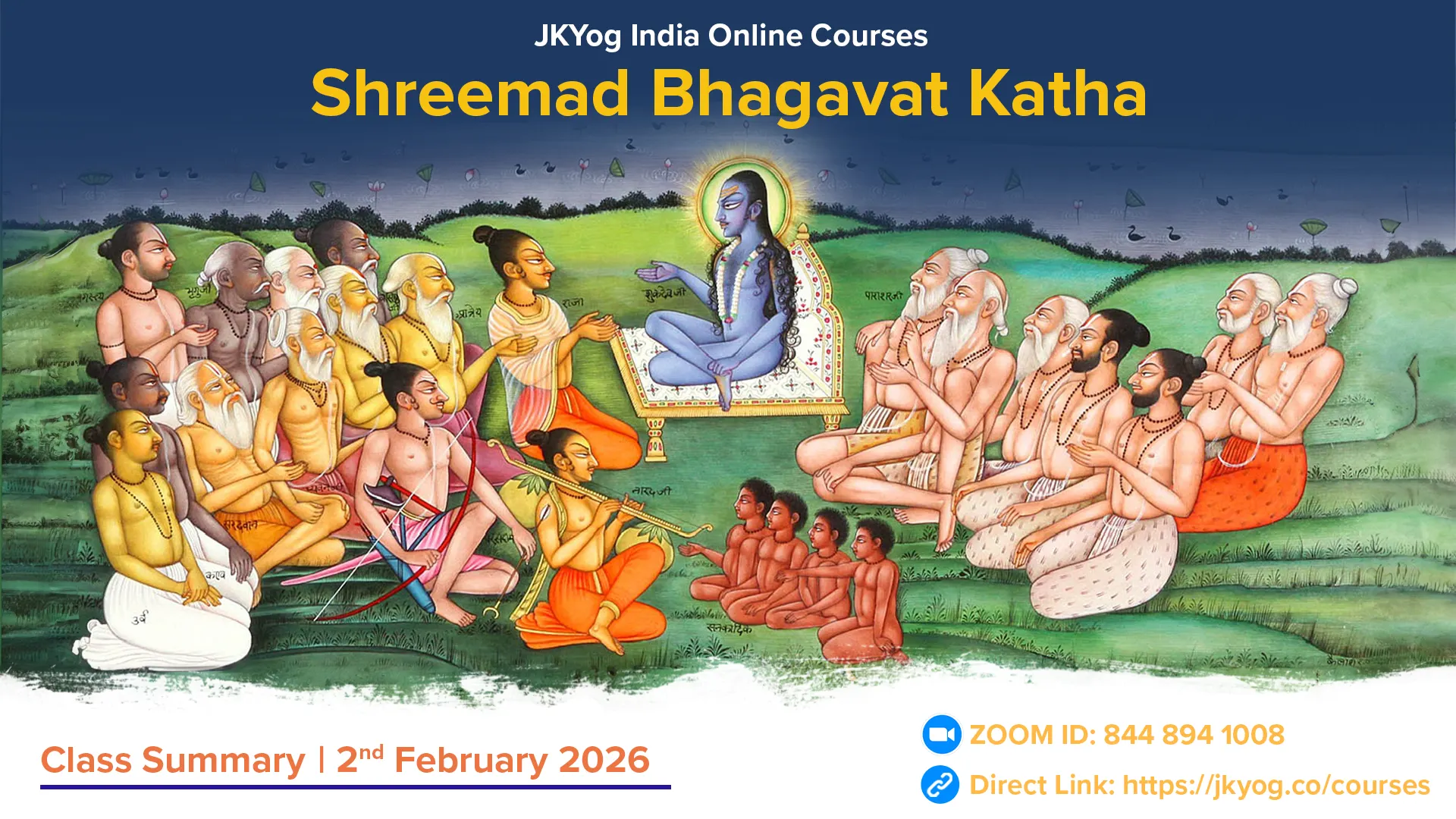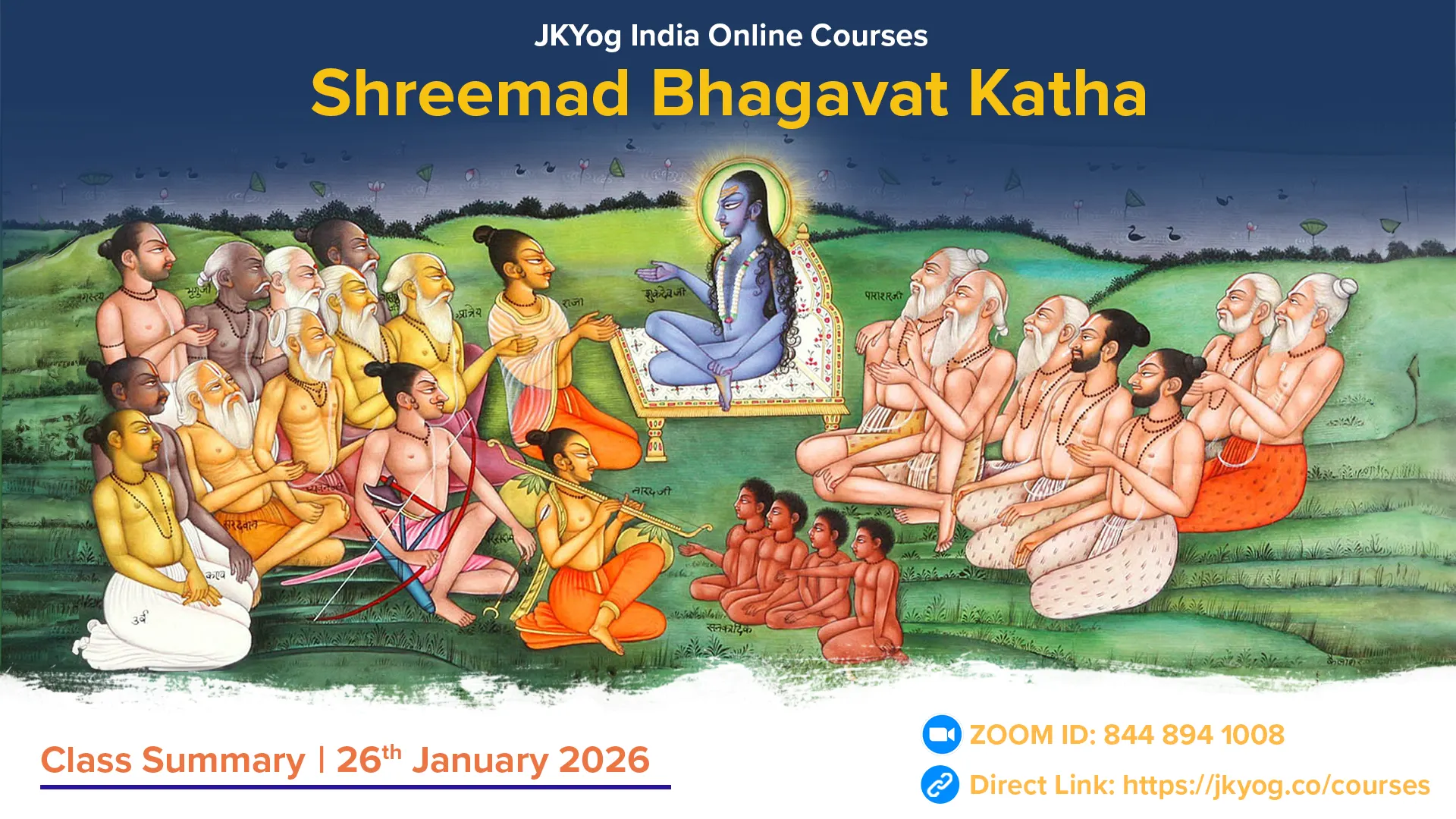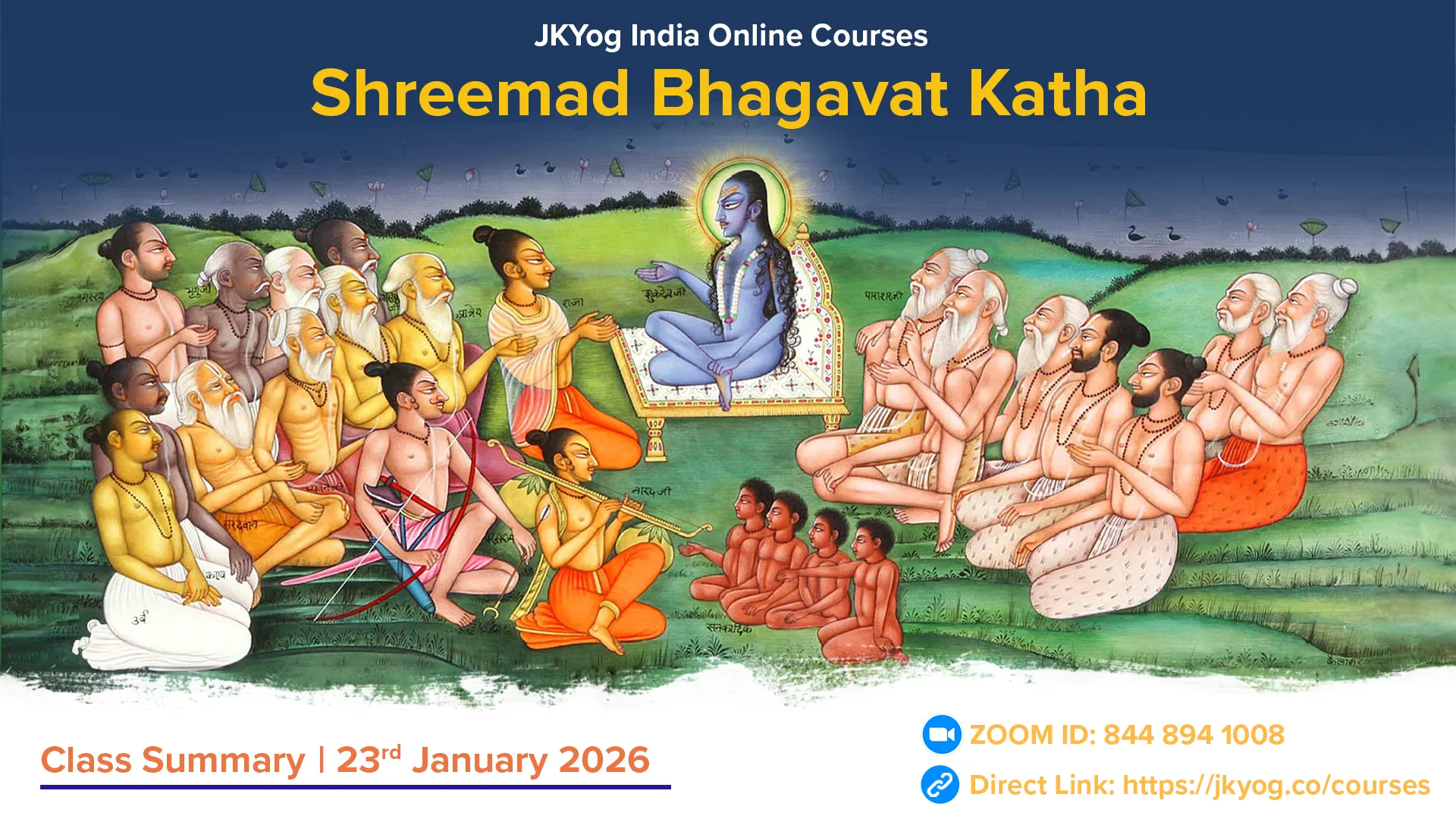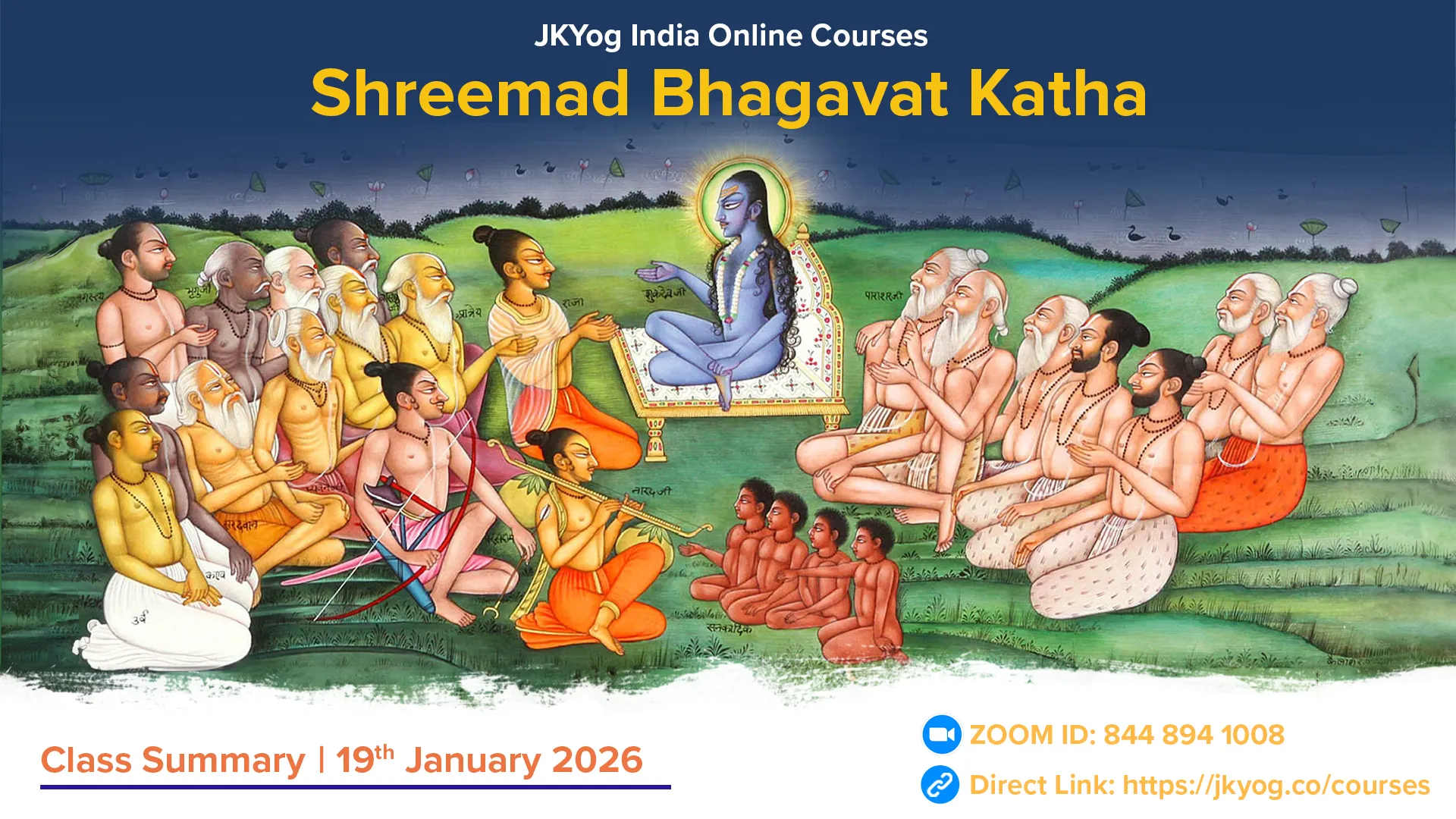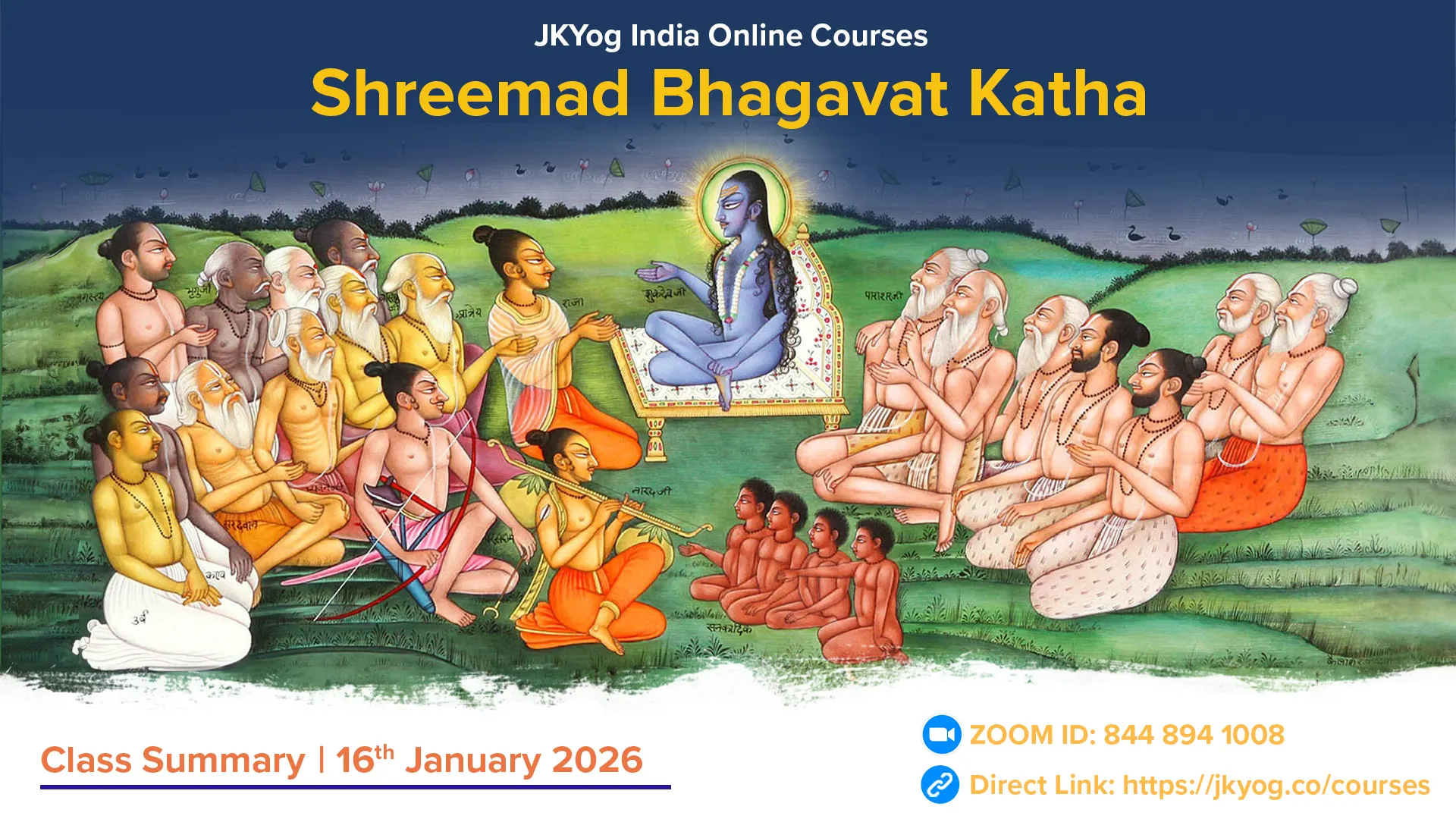Shreemad Bhagavat Mahapuran- Canto: 9, Chapters: 22-24
Shree Shukadevji tells Parikshit that from Yayati’s five sons, the youngest son, Puru, whose line further produced Ajamidha’s lineage, from which was born Divodasa’s son, Mitreyu. From him were born Chyavan, Sudas, Sahadeva and Somaka. Among Somaka’s hundred sons, the youngest was Prishata, from whom Drupada was born. Drupada had a daughter, Draupadi, and a son, Dhrishtadyumna. Dhrishtadyumna’s son was Dhrishtaketu. This lineage later came to be called Panchala.
In the Puru lineage itself, Samvarana was born, who married Tapati, the daughter of the Sun, and from her womb was born Kuru, who became the lord of Kurukshetra. From the Kuru lineage came Shantanu.
From Puru to the Kuru Dynasty: Birth of the Pandavas and Kauravas
- Shantanu’s brother, Devapi, renounced the world and took sanyas; hence, the kingdom went to Shantanu.
- Shantanu married Ganga, and from her was born Bhishma. Bhishma was supremely knowledgeable in Dharma and mighty in valour. He was the great hero who could even satisfy Guru Parashurama in battle.
- Shantanu’s second wife, Satyavati, bore Chitrangada and Vichitravirya.
- After Vichitravirya’s death, at Satyavati’s request, Vyasaji, through Niyoga, begot Dhritarashtra, Pandu and Vidura.
From Dhritarashtra and Gandhari came the Kauravas, the eldest being Duryodhana.
From Pandu came the Pandavas: Yudhishthir, Bhim, Arjun, Nakul and Sahadev. From the Pandavas and Draupadi were born five sons. From Arjun and Subhadra was born Abhimanyu, and from Abhimanyu was born Parikshit. Shree Krishna saved Parikshit from Ashvatthama’s Brahmastra.
Parikshit’s son was Janamejaya. He performed the Sarpa Satra yajna to destroy the serpents. From his descendants, this lunar dynasty continued up to Kshemaka and ended in Kaliyug.
In the Yadu Dynasty: Shree Krishna, Balaram, Uddhav and the Yadavs
Because of Yayati’s eldest son Yadu, this lineage was called Yadav. Later, many branches arose in it: Madhu, Vrishni, Andhak, Bhoja, Shurasen, etc.
Madhu branch
- From Yadu came → Madhu.
- Madhu had a hundred sons; the eldest was Vrishni.
- From them came the Vrishni dynasty, also called Varshneya and Madhava.
Vrishni branch
- Vrishni → Shvaphalka → Akrura (a great devotee of Krishna, brother of Rohini, mother of Balaram, hence maternal uncle of Krishna).
- Vrishni → Shini → Satyaki (Yuyudhana) (Krishna’s cousin, supporter of the Pandavas in the Mahabharat war).
- Vrishni → Hridika → Kritavarma (Krishna’s cousin, supporter of the Kauravas in the Mahabharat war).
- From Vrishni’s line further came the Shurasen, Andhaka and Bhoja branches.
Andhaka branch
- Ahuka → two sons: Devak and Ugrasen.
- Devak’s daughter Devaki was married to Vasudeva.
- From Devaki: first six sons (killed by Kamsa),
- seventh: Balarama (transferred into Rohini’s womb),
- eighth: Shree Krishna,
- daughter: Subhadra.
- Ugrasen’s son was Kamsa (slain by Krishna). Devaki was Kamsa’s cousin sister.
Shurasena branch
- Shurasen → Vasudev (also called Anakadundubhi), Devabhaga, Upadeva, Parijata and many other brothers.
- Devabhaga’s son was Uddhav, Krishna’s cousin, close companion and friend.
- Vasudev had eight wives. Main ones:
- Devaki (from the Andhaka branch) → Krishna, Subhadra.
- Rohini (from the Vrishni branch) → Balaram, Gada, etc.
- Shurasen’s daughter, Kunti (Pritha), was adopted by King Bhoja; she became the mother of the Pandavas.
- Other daughters:
- Shrutashrava → wife of Damaghosha → son Shishupal.
- Shrutakirti → wife of the Kekaya king → five Kekaya brothers.
- Shrutadeva → wife of the Karusha king → son Dantavakra.
- Rajadhidevi → wife of the Avanti king → sons Vinda and Anuvinda.
Bhoja branch
- Vidarbha → Chedi dynasty → Damaghosha → Shishupala.
Anu lineage
Yayati’s fourth son, Anu, had three sons → Shabhanara, Chakshu, and Paroksha.
Shabhanara’s branch
- Shabhanara → Ushinara.
- Ushinara → Shibi (the righteous and sacrificing king, who gave his own flesh to save a dove’s life).
- From Shibi came two major branches:
- Madra dynasty → from which later came Maadri (wife of Pandu and mother of Nakul–Sahadev).
- Kekaya dynasty → from which came five Kekaya brothers, brothers-in-law of the Pandavas.
- Karusha dynasty → Vasudeva’s sister Shrutadeva was married to the Karusha king. Their son was Dantavakra, who hated Krishna and was slain by Him.
Titikshu’s branch
- Titikshu → King Bali.
- From Bali’s wife, through Rishi Dirghatama, were born six sons: Anga, Vanga, Kalinga, Pundra, Andhra, and Suhma.
- After these six, the famous kingdoms of Eastern India were named.
Anga dynasty
- From the Anga dynasty came the famous King Romapada (friend of Dasharatha of Ayodhya).
- Later → Jayadratha (warrior of the Kaurava side in the Mahabharata war, key in the killing of Abhimanyu). Jayadratha’s wife → Dushala (daughter of Dhritarashtra–Gandhari).
- In Jayadratha’s line → Adhiratha. Adhiratha adopted a child found on the riverbank, who was Karna (the biological son of Kunti, but raised in the Anga dynasty).
Chedi dynasty
- From Vidarbha also came the Chedi dynasty.
- Chedi King Damaghosha’s wife was Shrutashrava (Vasudeva’s sister).
- Their son → Shishupal.
- Shishupal was Krishna’s maternal cousin and His great enemy.
Turvasu lineage
From Yayati’s second son, Turvasu came → Vahni → Gobhanan → Tribhanan → Karandhama → Marut. Marut was sonless. He accepted Puruvanshi Dushyant (husband of Shakuntala, father of Bharat) as his own son. Thus, this line merged into the Puru dynasty.
Druhyu lineage
From Yayati’s third son, Druhyu, came the Gandhara kingdom. From King Subala of Gandhara was born Gandhari, wife of Dhritarashtra and mother of the Kauravas. Her son Shakuni became the famous strategist of the Mahabharat, maternal uncle of the Kauravas.
Thus, from Yayati’s five sons emerged all the characters of the Mahabharat:
- Yadu → Krishna, Balaram, the Yadavs.
- Turvasu → lineage later merged into the Puru line.
- Druhyu → Gandhari, Shakuni.
- Anu → Shishupal, Jayadrath, Karna, Maadri, Kekaya brothers, Dantavakra.
- Puru → Pandavas, Kauravas.
The sacrifice of King Shibi
In the line of Anu’s son came King Ushinar, whose son Shibi became renowned for sacrifice and righteousness.
One day, a dove flew into his lap, trembling with fear. A hawk followed and demanded the dove, saying, “It is my prey. Give it to me or I will die of hunger.”
Shibi replied, “This bird has sought my protection. I cannot hand it over. If you need food, I will give you my own flesh.”
A balance scale was brought. On one side sat the dove, and on the other, Shibi placed pieces of his flesh. But the dove grew heavier each time. Finally, Shibi himself sat on the scale, ready to give his life.
At that moment, the gods appeared and revealed it was a test. They praised Shibi: “Your righteousness and sacrifice will be remembered for all time.”
The story of Romapada and Rishyashringa
Vibhandak Rishi, son of Kashyap, once travelled to Mahahrada. There he beheld the apsara Urvashi, whose beauty stirred desire in his heart. Overcome for a moment, he emitted his seed, which fell into the river. By destiny, a doe, who herself was an apsara cursed to live as a deer, swallowed the seed. Through the rishi’s miraculous powers, she conceived.
In time, the doe gave birth to a son with small horns. Freed from her curse, she returned to heaven. The child was named Rishyashringa, “the horned sage.”
Vibhandak, remembering his own weakness, resolved to keep his son far from society. He raised him in the deep forest, away from all contact with women. Rishyashringa grew up in perfect brahmacharya, knowing nothing of the world outside the hermitage. Through his chastity and penance, he acquired miraculous powers.
Meanwhile, in the kingdom of Romapada of Anga, drought struck, and the rains ceased. The sages declared, “Only the presence of the pure ascetic Rishyashringa can bring rain here.”
Romapada devised a plan. Courtesans were sent to the forest. With songs, sweet words, and gentle gestures, they won the trust of the innocent ascetic. Unfamiliar with women, Rishyashringa was captivated and followed them to the Anga region. As soon as he set foot in the land, rain blessed the kingdom.
But Romapada feared Vibhandak’s anger and the possible curse that would come with this deception. To make amends, he gave his daughter Shanta in marriage to Rishyashringa. Shanta was actually the biological daughter of Dasharath of Ayodhya, adopted by Romapada.
Later, when Dasharath longed for heirs, it was Rishyashringa who performed the Putrakameshti Yajna. Through this yajna, Bhagwan blessed Dasharatha with four sons- Ram, Lakshman, Bharat, and Shatrughna.
Sahasrabahu Arjun
In the Yadu line was the mighty king Kartavirya Arjun, also known as Sahasrabahu Arjun, the one with a thousand arms. Through deep austerities and devotion to Dattatreya, he was blessed with the eight siddhis, such as Anima (the power to become minute), Laghima (the power to become weightless), and unmatched physical strength.
Under his rule, the kingdom experienced significant growth and prosperity. His reign became legendary for justice and generosity. The doors of his palace were never shut; whoever came, whether rich or poor, would leave with charity. He treated his subjects as a father cares for his children, ensuring no one went hungry or unprotected.
But as time passed and his empire expanded, a change came over him. Surrounded by wealth, power, and the knowledge of his siddhis, pride began to creep in. Kartavirya Arjun began to think he was unconquerable, greater even than the sages and the gods. With arrogance came cruelty. He started to trouble Brahmins, disrupt sacrifices, and insult those who once blessed him.
This decline from righteousness could not last. When his oppression became unbearable, the responsibility fell upon Bhagwan Parashuram, who, with unmatched might, fought Kartavirya Arjun and, after a fierce battle, struck him down.
At the end of the ninth canto of Shreemad Bhagavat, Shukadevji tells Parikshit that whenever dharma declines and adharma increases, Bhagwan Shree Hari incarnates. When the Earth became burdened by the oppression of the asuras, Bhagwan Madhusudan descended with Balaram.
The stories of Shyamasundar Shree Krishna are so pure that by singing and hearing them, man’s sorrows and ignorance are removed. His form, His smile, and His words filled everyone with bliss.
Bhagwan was born in Mathura, grew up in Gokul, then in Mathura and Dwarka He slew demons, married, and established Dharma through yajnas. In the Mahabharata war, He became Arjuna’s charioteer, lightened the Earth’s burden, and finally, after imparting wisdom to Uddhava, returned to His supreme abode.
Summary: JKYog India Online Class- Shreemad Bhagavat Katha [Hindi]- 14.09.2025

